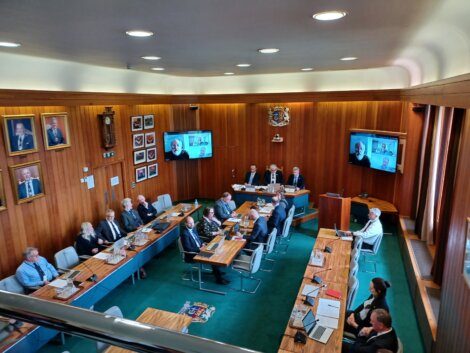Council / Orkney councillors back motion to look at range of options for governance
Shetland Islands Council passed a similar motion in 2020
A MOTION to explore some of the different ways Orkney could be governed has won the back of its full council.
The motion is similar to the one approved by Shetland Islands Council in 2020.
The Orkney motion was brought forward by the council leader James Stockan in front of the council’s full roster of 21 councillors this morning (Tuesday).
It proposes that the council “explore options for alternative models of governance”.
This includes looking to its Nordic links and the governance arrangements of other islands groups such as the Faroe Islands and the Channel Islands.
The background to this, as was unanimously acknowledged by councillors, is frustrations over the council’s treatment by the Scottish and UK Governments.
Specific issues such as the lack of Road Equivalent Tariff (RET) for Orkney and the council’s requests for aid in replacing the county’s internal ferry fleet.
Councillor Stockan began by telling councillors he was “speaking from the heart, not the head” today.
During the meeting, councillor Stockan said he has “lost faith” in the Scottish and UK Governments.
Many who spoke gave their feelings on the significant amount of media attention Stockan’s motion has attracted.
While the vote went in favour of the leader’s motion, some spoke passionately against it.
Councillor David Dawson cited the experience of Brexit as a reason for the council not to start looking at cutting ties with Scotland and the UK.
The fact that the proposed investigations would take a substantial commitment – in terms of officer time and money – from the staff and cash-strapped islands council, wasn’t lost on councillor Dawson.
The councillor remarked that the leader’s motion ranged from the “arguably reasonable” scenarios to what he called the “frankly bizarre fantasy” of becoming a self-governing territory of Norway.
Become a member of Shetland News
Dawson said to spend public money on the investigations could be seen as “fiddling while Rome burns”.
Councillors Steven Heddle and Lindsay Hall also spoke out against the council leader’s motion.
Heddle said the councillors had been “kept in the dark” regarding the motion.
Others argued caution, with councillor Rachael King appealing for discussions to “slow down” on any issue related to self-governance.
Backing Stockan’s motion, councillor Gillian Skuse said “we have to do something”.
Councillor Duncan Tullock also backed the motion, and said he is “fed up of the council living off crumbs”.
He said the council had to look for more support than it was getting “whether it comes from London, from Edinburgh, or from Timbuktu”.
Stockan repeatedly stressed this his motion proposes an investigation of all options for the council’s future.
The outcome of the meeting that was six councillors wanted there to be no more movement from the council on this issue. However, that left 15 councillors backing the leader’s motion.
Following the main debate an amendment was added by Heddle, who asked for the council’s own Constitutional Reform Group to be “reinvigorated”.
Back in 2020 the full Shetland Islands Council overwhelmingly voted to explore options of achieving financial and political self-determination.
Similarly to Orkney, there was frustration over the relationship between government and Shetland – particularly when it came to funding.
“I will continue to push for progress on investigating Shetland’s future and I wish our Orcadian neighbours well in their efforts to do the same,” he added.
By Orkney local democracy reporter Andrew Stewart
Become a member of Shetland News
Shetland News is asking its many readers to consider paying for membership to get additional features and services: -
- Remove non-local ads;
- Bookmark posts to read later;
- Exclusive curated weekly newsletter;
- Hide membership messages;
- Comments open for discussion.
If you appreciate what we do and feel strongly about impartial local journalism, then please become a member of Shetland News by either making a single payment, or setting up a monthly, quarterly or yearly subscription.


















































































